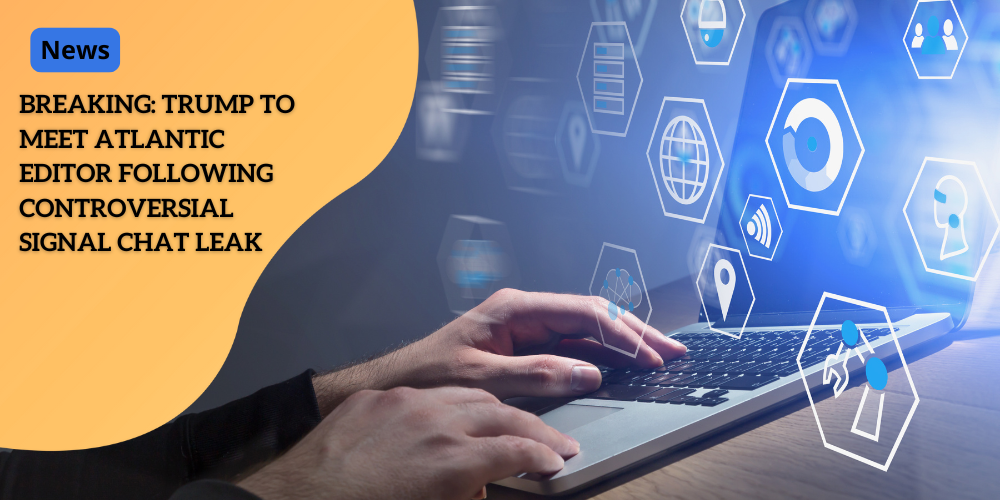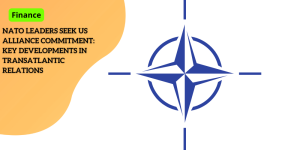Breaking: Trump to Meet Atlantic Editor Following Controversial Signal Chat Leak

Anúncios
Accidental Inclusion in Signal Chat 📱💬
Jeffrey Goldberg, editor-in-chief of The Atlantic, was inadvertently added to a Signal group chat with Trump administration officials.
The chat, meant for high-level discussions, contained sensitive details about air strikes against Houthi targets in Yemen.
Anúncios
Goldberg found himself privy to operational specifics, including the timings and weaponry involved in the planned attack.
This unintended access has ignited a heated debate over the handling of military information within the Trump administration.
Anúncios

Sensitive Details Shared 🔓
Within the chat, Goldberg discovered text messages indicating when F-18 fighter jets would take off, when bombs were set to drop on Houthi targets, and the timing for firing Tomahawk missiles. U.S.
Defense Secretary Pete Hegseth shared these operational details, claiming the information was not classified.
Despite Hegseth’s reassurances, the presence of such specific war-planning information in the chat raises serious concerns.
Trump’s Administration Response 💬
After the incident was publicized, the White House attempted to downplay its significance.
Officials argued that no classified information was involved, labeling Goldberg’s reporting exaggerated.
In response, Goldberg decided to publish the full text messages to counter these claims, asserting that the shared information was indeed sensitive and crucial to military operations.
Trump backed Hegseth, describing Goldberg as a “sleazebag” and maintaining that Hegseth was “doing a great job” despite mounting criticism.
The administration’s dismissive stance on the shared information contributed to Goldberg’s decision to publish the messages, providing the public a clearer picture of the discussions within that private chat.
Controversy and Public Concern 🤔
Goldberg’s revelation has led to widespread concern about the proper handling of sensitive military information.
Critics argue that lower-ranking officials would face severe repercussions for similar actions, highlighting potential disparities in accountability standards within the Trump administration.
The incident has spurred calls for a thorough investigation, with Democratic lawmakers and some Republicans demanding greater transparency and stricter regulations to prevent such lapses in information security.
As the fallout continues, this development underscores the complex challenges of maintaining confidential discussions amidst modern communication tools, creating a backdrop for Trump’s upcoming engagement with The Atlantic and its editor. 📱💭
Trump’s Upcoming Meeting with Goldberg 🤝
President Trump has announced on social media that he will be meeting with Jeffrey Goldberg, Editor-in-Chief of The Atlantic, following the controversy surrounding the Signal chat leak.
This news has quickly become the talk of Washington, especially given Trump’s history of contentious relations with the press.
Trump’s Skepticism and the Announcement 🧐
On Thursday, Trump took to his social platform to disclose the upcoming interview with Goldberg.
In his post, Trump voiced doubts about The Atlantic‘s ability to report fairly on him, framing the meeting as a personal challenge to the publication and a test of its integrity.
The President’s message was laced with a skeptical tone, questioning whether Goldberg and his colleagues, Ashley Parker and Michael Scherer, could objectively cover his presidency.
“I am doing this interview out of curiosity, and as a competition with myself, just to see if it’s possible for The Atlantic to be ‘truthful.'” – President Donald Trump.
Key Participants 🧑💻🎤
The interview promises to be a significant media event.
Alongside Goldberg, The Atlantic‘s team will include experienced journalists Ashley Parker and Michael Scherer.
Both reporters have earned reputations for their meticulous and thorough reporting.
Their involvement indicates that The Atlantic is taking this opportunity seriously, potentially aiming to deliver a comprehensive and balanced account of Trump’s tenure.
The Stakes of the Interview 🎙️💥
Trump’s characterization of the interview as a test for The Atlantic adds a layer of drama to the upcoming meeting.
The interview will likely address the Signal chat incident and the broader issues it raises about national security and government accountability.
Given Trump’s combative history with the media and his specific criticisms of Goldberg, the interaction is bound to be intense.
Transition 🔄
The interview’s outcomes could have far-reaching implications, both for Trump’s relationship with the press and for the ongoing debate over the security of sensitive information within his administration.
As Washington waits in anticipation, the stage is set for a confrontation that may shed new light on these critical issues.
The Fallout and White House Response 🏛️
The White House Downplays the Incident 📰
The White House has consistently minimized the significance of the Signal chat leak incident.
Officials have maintained that the information shared in the chat with Jeffrey Goldberg was not classified.
President Trump himself reaffirmed this stance, suggesting that the details revealed were not of any national security concern.
Unwavering Support for Pete Hegseth 👍
Despite the controversy, President Trump has shown unwavering support for Defense Secretary Pete Hegseth.
Throughout the fallout, Trump has insisted, “Pete’s doing a great job everybody’s happy with him.
The support continued even in light of a second revelation, where similar sensitive discussions were shared in another private Signal chat involving Hegseth’s wife, brother, and personal lawyer.
Personal Attacks on Goldberg 💥
As expected, the administration officials didn’t hold back in attacking Jeffrey Goldberg’s credibility.
Various figures within the Trump administration have labeled Goldberg as a “sleazebag,” “loser,” and “liar.”
National Security Advisor Michael Waltz, who mistakenly added Goldberg to the chat, has referred to him as “scum” and denied any significant acquaintance, although Goldberg countered, noting they had met on several occasions.
Defense of Actions Amid Criticism 🛡️
The administration’s defense hinges on the assertion that nothing of critical importance was disclosed.
Officials argue that the leaked details, which included specific timings and operational aspects of planned air strikes, did not constitute classified war plans.
Pete Hegseth himself downplayed the gravity of the shared information, even after Goldberg published the complete text messages revealing precise operational specifics.
Accountability Standards Questioned ⚖️
This incident has prompted debates about the varying standards of accountability within the Trump administration.
While high-ranking officials seem to escape serious repercussions, critics argue that lower-ranking personnel would likely face firings and prosecution for similar mishandling of information.
This disparity has fueled calls from both Democratic lawmakers and some Republicans for an investigation into the matter.
Transition 🔄
As tensions between Trump and The Atlantic soar, the spotlight shifts to broader questions about accountability, security, and media relations within the administration.
The Second Signal Chat Revelation 📱💥
Following the uproar over the first Signal chat leak, a new wave of controversy has hit the Trump administration.
Reports have surfaced about a second private Signal group chat where Defense Secretary Pete Hegseth allegedly shared sensitive military information.
This group consisted of some surprising members: Hegseth’s wife, his brother, and his personal lawyer.
None of these individuals hold official military positions, adding to the growing concerns about information security within the administration.
Details of the Second Chat 📝
The second Signal group chat appears to replicate the dubious practices seen in the initial revelation.
According to various sources, Hegseth shared operational details about military actions against Houthi targets in Yemen.
This included information on airstrikes and the deployment of specific weaponry.
Much like the first chat, these actions violated standard protocols for handling such sensitive data.
The Family and Friends Circle 👨👩👦
| Individual | Role and Relevance |
|---|---|
| Jennifer Hegseth (Wife) | Former Fox News producer with no official capacity or need-to-know basis for military strategies. |
| Phil Hegseth (Brother) | Holds a position within the Department of Defense, but his role does not involve specific military details. |
| Tim Parlatore (Personal Lawyer) | Personal lawyer with no qualifications to receive confidential operational information. |
Revelations and Repercussions 🔥
The White House has continued its stance of downplaying the significance of these leaks.
The administration maintains that no classified information was divulged in the second chat, similar to their response to the initial revelation.
This repeated downplaying has done little to quell public and political discontent.
Escalating Concerns ⚠️
Critics argue that such nonchalant handling of sensitive information would have severe consequences for lower-ranking officials.
Former U.S. Attorney General Michael Mukasey commented, “If a junior officer mishandled information this way, they’d face court-martial”.
This sentiment resonates strongly, as it underscores a perceived double standard in accountability.
A Symptom of Greater Issues 💬
Overall, these repeated incidents highlight growing concerns about the administration’s approach to national security and information handling.
The missteps underscore the necessity for stricter controls and more accountable communications practices, especially at the highest levels of government.
The fallout from these revelations is ongoing, with both public trust and ally confidence hanging in the balance.
As these controversies unfold, it is apparent that reassessing how sensitive information is managed is imperative.
The trust and safety of the nation’s operations depend on rigorous adherence to protocols, something the Trump administration must address to restore faith in its handling of national security matters.
Goldberg’s Defense and Journalistic Approach 📝
Withholding and Publishing Details 🛑
Jeffrey Goldberg’s approach to the Signal chat incident was both cautious and calculated.
Initially, he chose to withhold specific operational details in his first article about the chat.
He believed that keeping certain information private was necessary, especially given the sensitive nature of the military discussions he had inadvertently accessed.
However, after the Trump administration downplayed the severity of the information shared, calling Goldberg a liar and denying that any classified data was exposed, Goldberg decided to release the full text messages.
This decisive move provided transparency and allowed the public to judge for themselves the level of sensitivity involved.
Defending the Decision ⚖️
Goldberg defended his decision to publish the texts, arguing that the statements from administration officials undermined the seriousness of the situation.
He stated, “Once Donald Trump said there was nothing to see here, essentially, and once Tulsi Gabbard and John Ratcliffe said there was no sensitive information, no classified information, et cetera – we felt like, hm, we disagree.”
Responsible Journalism 🗞️
Goldberg maintains that leaving the chat after realizing his accidental inclusion was the responsible action to take.
He acknowledged the ethical and legal complexities of the situation, explaining that remaining in the chat could have entailed further exposure to highly sensitive discussions.
His departure was guided by advice from various parties, ensuring that he avoided deeper entanglements.
Accountability and Consequences ⚖️
Goldberg’s actions have highlighted a glaring issue: the varying standards of accountability within the Trump administration.
Critics argue that a lower-ranking official would likely face severe consequences for similar mishandlings of sensitive information.
Goldberg’s decision to publish the text messages underscores his commitment to transparency and accountability in journalism.
Transition to Next Topic 🔄
As the debates about information security and accountability continue, it remains crucial to examine the broader implications of such incidents within the administration.
National Security Implications 🚨
Critics have voiced serious concerns about the handling of sensitive information within the Trump administration following the Signal chat incident.
It’s argued that if lower-ranking officials had mishandled sensitive military details in the same way, they would face severe repercussions, including termination and possible prosecution.
This revelation has fueled demands from Democratic lawmakers and some Republicans for a thorough investigation into the incident.
Accountability Standards 🏛️
The disparity in consequences for handling sensitive information is particularly troubling.
Critics point out that a protective bubble seems to exist around higher-ranking officials.
Jeffrey Goldberg’s accidental inclusion in the Signal chat exposed discussions about air strikes against Houthi targets in Yemen, and the White House’s attempt to downplay the severity of this mistake has only intensified scrutiny.
Administration officials continue to defend Defense Secretary Pete Hegseth, despite him sharing similar military information in another private Signal chat involving individuals with no official military positions.
Lawmakers’ Demands for Investigation 🗳️
Amidst the controversy, bipartisan calls for an investigation have emerged.
Lawmakers stress that accountability standards must be consistent regardless of rank.
Democratic representatives and some Republicans have expressed urgency in scrutinizing how such sensitive information was disseminated through informal channels like Signal.
They argue that a meticulous review of the incident is necessary to uphold national security protocols and ensure that there are no repetition of such lapses in the future.
Ethical Concerns and Transparency 🔍
The handling and subsequent leaking of sensitive information raise ethical concerns about transparency within the Trump administration.
The White House’s dismissive attitude towards the leak, despite its national security implications, highlights the need for clear and enforceable communication protocols.
Goldberg’s decision to publish the full text messages from the chats further emphasizes the importance of responsible journalism and the public’s right to know.
Media Relations and Trump’s History with The Atlantic 📚📰
The upcoming interview between President Trump and Jeffrey Goldberg, editor-in-chief of The Atlantic, is highly scrutinized due to their tumultuous history.
This isn’t the first time Trump has clashed with Goldberg. In 2020, Goldberg published a controversial article quoting senior military officials who claimed Trump referred to fallen American soldiers as “suckers” and “losers.”
Trump and his administration vehemently denied these accusations, labeling Goldberg’s reporting as false and defamatory.
Tense Relationship with Mainstream Media 📺💥
The incident involving the Signal chat leak only exacerbates the strained relations between Trump and mainstream media outlets.
The contentious meeting brings this animosity to the fore, as Trump frames the interview as a test to determine if The Atlantic can report ‘truthfully’ about him.
Goldberg’s accidental inclusion in a Signal group chat discussing sensitive military details also amplified the existing distrust and highlighted the significance of managing confidential discussions amid evolving communication technologies.
Goldberg’s Role in the Controversy 📰💬
Goldberg’s role in the latest controversy reflects his long-standing position in political journalism, often placing him at odds with the Trump administration.
While Goldberg has thrived on his investigative reporting, it has also made him a central figure in political disputes.
Trump has frequently condemned Goldberg, including recently calling him a “sleazebag” and “loser” following the Signal chat leak.
Despite the personal attacks, Goldberg remains steadfast in his journalistic integrity, defending his decision to publish operational details after administration officials downplayed the sensitivity of the information.
The Implications for Media Relations 🧐
The interview will undoubtedly serve as a focal point in the evolving narrative of media relations and national security.
Trump’s continued skepticism toward mainstream media and his aggressive defensive tactics highlight the broader challenges facing journalistic entities.
As Goldberg stands his ground, the meeting underscores the critical role of responsible journalism in holding power to account and navigating the complexities of reporting on confidential government matters.
As this chapter concludes, the unfolding dynamics of accountability and national security within the administration come into sharper focus.






